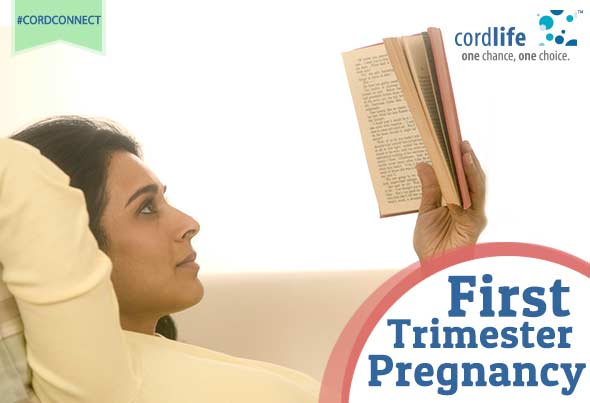Table of Contents
The first trimester of your pregnancy is a confusing time. You may not realise that you are pregnant till six weeks have elapsed. But in reality, though you remain unaware of the major life event taking place inside your womb, your baby has already started to develop.
It is almost impossible to determine the exact date and day of conception. However, the first four weeks are counted from the date of your last period. During this time, the sperm penetrates an egg and the union results in a zygote, which is a single cell. This cell then begins to split into more cells, eventually forming an embryo that attaches itself to the uterine wall. You will notice the first sign of pregnancy when this happens – there is mild spotting or a pale pink discharge that you might confuse with a light period.
In the first trimester, the embryo starts to get more defined in shape and appearance. Initially it appears like a shapeless mass, but soon, it is defined by a bulbous head, two fin-like arms and paddle-like feet. The baby’s torso is amorphous at this time, though the tiniest hints of internal organs are present as the days go by. It is said that one of the first organs to develop is the baby’s brain – though it is miniscule at this stage, there are traces of neural activity.
During this time, you will begin to notice changes in your body. Your abdomen begins to feel full, you might feel slightly bloated and your breasts will become fuller and tender to the touch. By Week 6, you will have missed your period and already confirmed your pregnancy. The first signs of morning sickness also appear at this time. Even as you adjust to the idea of carrying your baby, the embryo rapidly develops during this time.
The first trimester is also the time to be really careful with the baby. The chances of miscarriage are the highest during this time, so any signs of bleeding must be instantly reported to the doctor. Mild spotting during this time is normal, and it tapers off after a while. However, if you experience heavy red discharge through the vagina, it is time to rush to the emergency room of the hospital because it can indicate a miscarriage.
At times, the embryo does not anchor itself to the uterine walls but remains lodged inside the Fallopian tube (ectopian pregnancy). Since it grows rapidly in size during the first trimester, these three months will also be crucial for you if you are carrying an ectopian foetus. The growing foetus can rupture the tube and cause internal bleeding.
Once you get through the first trimester, the rest of your pregnancy progresses relatively smoothly
